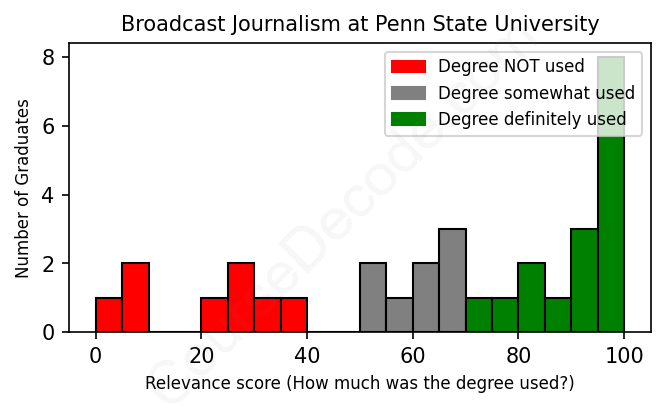
First, some facts. Of the Broadcast Journalism graduates from Penn State University we've analyzed , here's how many have used (or NOT used) their degree in their career:

These are estimates based on AI analysis of 32 LinkedIn profiles (see below).
The verdict? Slightly below average. Overall, with an average relevance score of 66%, Broadcast Journalism graduates from Penn State University have a slightly lower likelihood (-1%) of finding work in this field compared to the average graduate across all fields:
And for comparison, here's the chart for all profiles we've looked at across all degrees.
Also, after graduating, only 12% of these graduates have pursued further education other than another Bachelor's degree (such as a Masters degree or other), compared to the average across all profiles of 35%. This suggests a Bachelors degree is enough for most Broadcast Journalism graduates, and it's normal to look for work straight after graduation.
See the details:
|
Relevance score: 100% We think this person has gone into a career highly relevant to their degree. We think this person has gone into a career highly relevant to their degree.
DEGREE INFOGraduated in 2023 from Penn State University with a Bachelor of Arts - BA in Broadcast Journalism. No other secondary education since. JOB HISTORY SINCE GRADUATIONMultimedia Content Creator at Super Bowl LVII The Associated Press Feb 2023 - Feb 2023 Social Media Intern  NFL Films Aug 2023 - Feb 2024 Social Media Video Editor  Bleacher Report Apr 2024 - Present ABOUTNo information provided. |
The top 10 most common jobs done by the graduates we've analyzed (ranked most common to least) are:
People who graduated with a degree in Broadcast Journalism from Penn State University have ventured into a variety of careers post-graduation, but there tends to be a certain trend in the types of jobs they’ve landed. Many alumni have been involved in positions that are heavily tied to media production, including roles like Production Assistants and Associate Producers at prominent networks like NBC and ESPN. Additionally, several positions, such as News Anchors and Multimedia Journalists, directly leverage the core skills and knowledge acquired during their studies, emphasizing both reporting and communication. It's evident that those who pursued more conventional media roles have a strong connection to their degree, with significant relevance to broadcast journalism principles in their day-to-day activities.
However, there’s also a noticeable number of graduates working in roles that are less directly related to broadcast journalism. Many have taken on positions in marketing, public relations, and even administrative roles that don’t utilize journalism skills to a significant extent. Some have ended up in industries like education or business management, where the connection to their broadcast journalism training is partial at best. So, while a good chunk of alumni goes on to relevant careers in media and broadcasting, a fair number find themselves in roles that diverge from the journalism path established by their degree. It’s a mixed bag, but it seems that if you’re aiming to work in broadcast journalism, there are definitely avenues within the field still waiting for you. Just keep in mind that it might also lead you to unexpected places!
Here is a visual representation of the most common words in job titles for Broadcast Journalism graduates (this is across all Broadcast Journalism graduates we've analyzed, not just those who went to Penn State University):

When it comes to graduates from Penn State University's Broadcast Journalism program, the career trajectories vary quite a bit, which is pretty common in the field. Many of these graduates get their start in entry-level positions like production assistants or interns right after college. For instance, we see alumni landing roles as Production Assistants at major networks like NBC, ESPN, or other media organizations, which is a solid foundation for building experience in the industry. Some also venture into public relations or marketing roles early on, indicating a bit of flexibility in their career paths. However, there are also instances where their first jobs seem to stray away from traditional journalism roles, such as being an administrative assistant or even in unrelated fields. This shows that while some graduates stay true to their broadcast journalism roots, others explore different avenues, possibly due to the competitive nature of the media landscape.
Fast forward five to ten years, and the landscape becomes even more interesting. A notable number of graduates eventually find themselves in significant roles, either continuing their journey in journalism as news anchors, producers, or multimedia journalists at reputable companies. For instance, several alumni have made names for themselves as on-air personalities or reporters at stations like CBS, NBC, or even local media outlets, which is definitely a win for the program. Yet, there are also those who pivot towards different fields altogether or take on roles that might not directly tie back to their degree, like marketing coordinators or administrative positions. So, it's a mixed bag—while many seem to find good careers relevant to what they studied, others end up in jobs that, while respectable, don't align as directly with broadcast journalism. Overall, it looks like there's a fair chance for success, but also a reminder that career paths in journalism can take unexpected turns.
Honestly, a Bachelor’s degree in Broadcast Journalism, whether at Penn State or elsewhere, can be a pretty mixed bag in terms of difficulty. You’ll find a good blend of hands-on work—like producing, editing, and presenting—alongside the usual coursework about media law and ethics. The practical side can be super fun because you're actually creating content, but it can also be stressful with tight deadlines and the pressure to be on top of the news. If you're passionate about storytelling and willing to put in the effort, it can definitely be manageable; just be ready to juggle projects and keep up with current events! Overall, it might be a bit more demanding than some other degrees, but if you love what you're doing, it makes the challenge worthwhile.
Most commonly, in the LinkedIn profiles we've looked at, it takes people 4 years to finish a Bachelor degree in Broadcast Journalism.
Looking at these graduates from Penn State University, it seems like they've had pretty decent career paths, especially those who landed jobs at well-known places like ESPN, NBC, and various news networks. Many appeared to start at lower-level positions, which is common in the broadcast journalism field, but several have climbed the ladder to roles with more responsibility and, likely, better pay. For instance, graduates who are now producers or directors usually earn more than those in entry-level or intern roles. However, it’s also clear that some have taken longer or more varied paths through positions that might not pay as well, like assistant roles or marketing jobs. Overall, while some definitely seem to be doing well financially, others might still be working their way up to where they'd feel more comfortable in terms of salary.
Here is a visual representation of the most common words seen in the "about" section of LinkedIn profiles who have a Bachelor degree in Broadcast Journalism (this is across all Broadcast Journalism graduates we've analyzed, not just those who went to Penn State University). This may or may not be useful:

Here are all colleges offering a Bachelor degree in Broadcast Journalism (ordered by the average relevance score of their Broadcast Journalism graduates, best to worst) where we have analyzed at least 10 of their graduates:
| College | Score | Count |
|---|---|---|
 Penn State University Penn State University
|
66 | 32 |
 Arizona State University - Walter Cronkite School of Journalism and Mass Communication Arizona State University - Walter Cronkite School of Journalism and Mass Communication
|
64 | 11 |
 University of Maryland College Park University of Maryland College Park
|
60 | 10 |
 University of North Texas University of North Texas
|
38 | 10 |